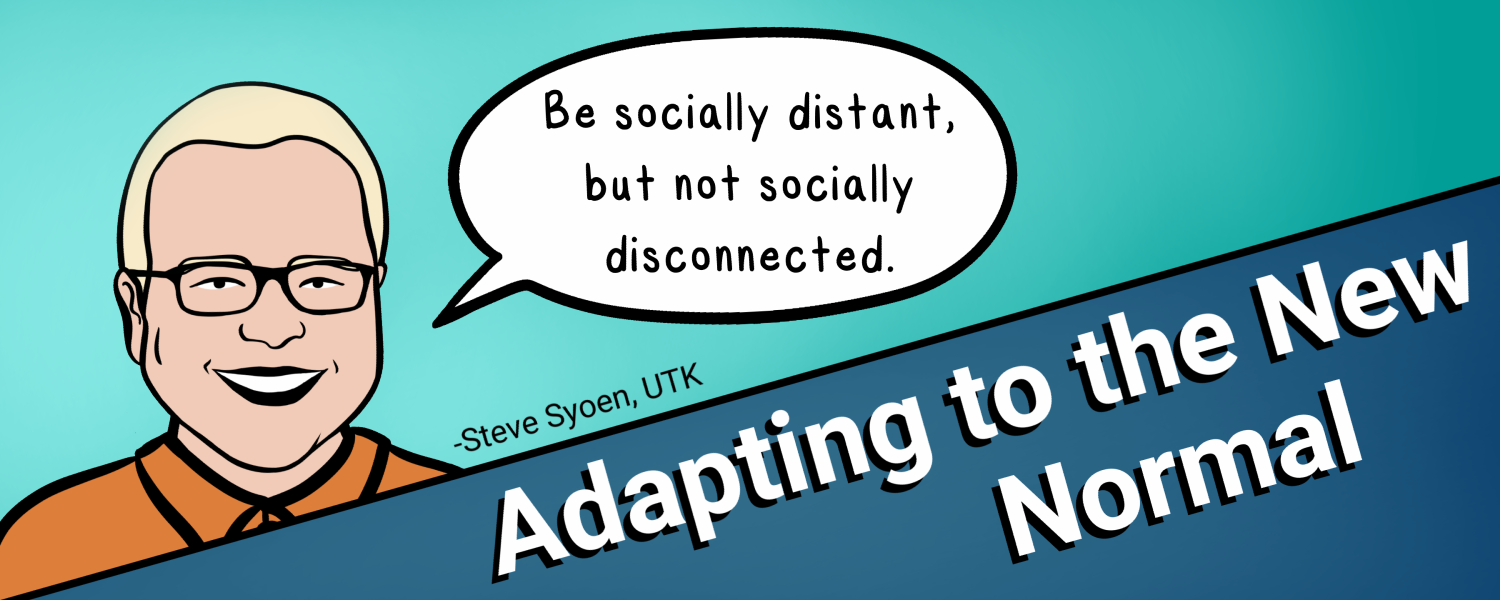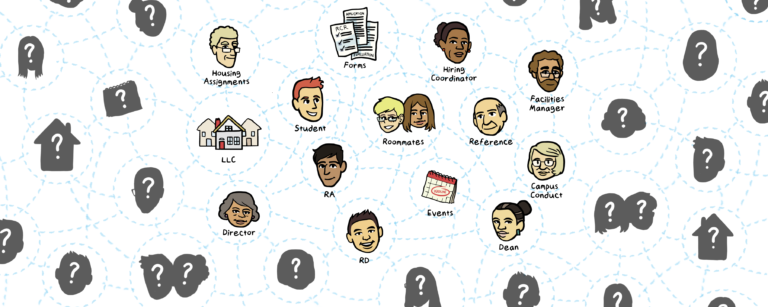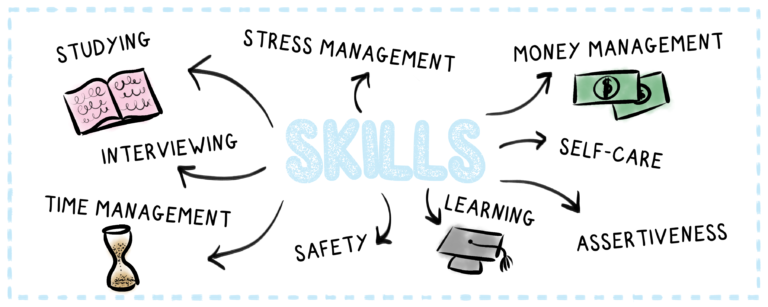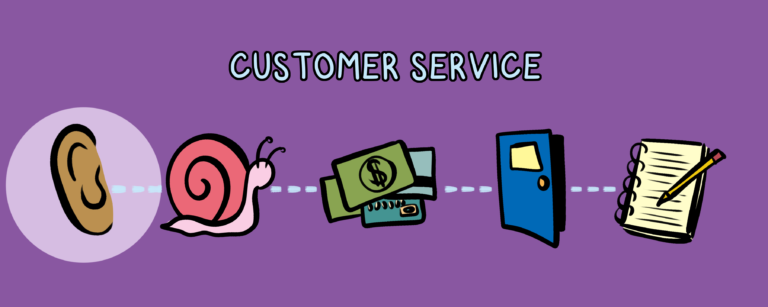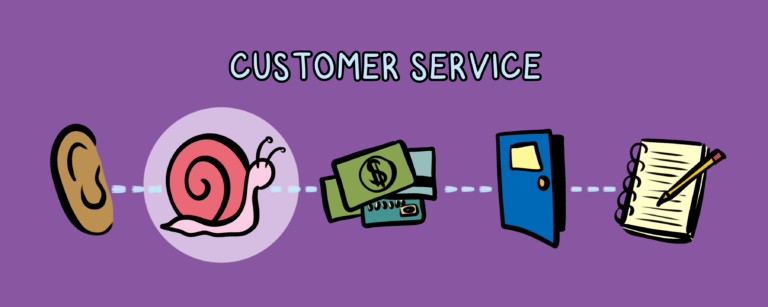Oh, hey! Welcome to the community.
There is a new normal out there, and it’s a difficult one for the industry we work in. As an essential service, many housing and residence life operations are balancing the expectation to stay home with the expectation to care for their students who remain in residence and those that continue to require support from afar. On top of that, you’re adapting to different expectations at your institution and different expectations at home, potentially feeling isolated and exhausted. We need to adapt, as we don’t know how long this normal will last.
In a quick poll, we asked some of our clients where they are currently working:
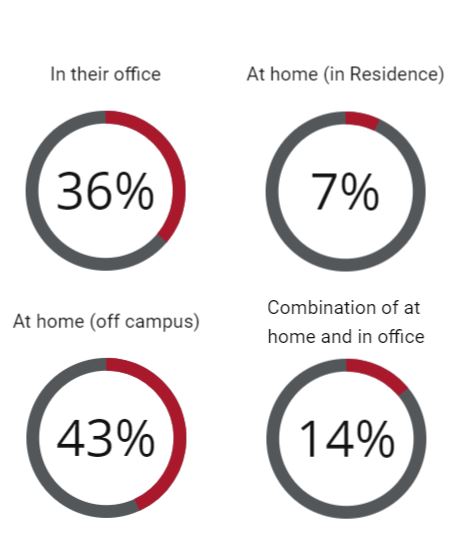
Despite the differences in work environments, all of our colleagues are experiencing a great deal of change in a short period of time. You’re forced to adapt programs, rethink protocols, and defend budget expenses. As I consider the stress of this time, I often reflect on a quote I read a couple of weeks ago:
“I encourage everyone to focus on what we can do rather than on what we cannot do… People are understandably nervous and worried as our lives are being impacted in unsettling ways. But we are also caring and thoughtful, and it is the time to show our determination to take care of each other and our communities. This is not the time to worry about having perfect answers. It is the time to work together in the best ways we can.“
David Farrar, President and Vice-Chancellor at McMaster University (2020)
Community support and connections are crucial during this time. Continuing to connect and learn from each other is what will help you make educated decisions and feel like you’re not alone in an unprecedented situation. As I’ve heard Steve Syoen at the University of Tennessee, Knoxville regularly say, “Be socially distant, but not socially disconnected.” He follows up on that sentiment by reminding staff and students to check on their teams and other friends, family, and colleagues. We could offer motivational words; however, it is likely more valuable to hear the advice of your colleagues.
- “Keep a ta-da list in addition to a to-do list so that you can celebrate all of the things that you have accomplished each day – nothing is too small to make the list!” – Annie Herold, Emory University
- “There is nothing “typical” about COVID-19 or our response to the pandemic, so we’re being forced to look at how to break away from the typical way of doing things. While this has been a distinct challenge in regards to crisis management, I think it’s also a learning opportunity to rethink the way we offer services to students. I plan to use this time to get creative and innovative with my work so I can meet students where they’re at.” – Laura Jo Rieske, Virginia Commonwealth University
- “Give yourself grace and space during this transition. It’s hard the first time you run a meeting or something on Zoom and it doesn’t go as well as planned. It’s easier to hold meetings in person.” – Steve Syoen, University of Tennessee, Knoxville
- “While so much of what is happening is out of my control, there are things I can still control, and that has brought me peace. I have control over sticking to my regular schedule, including working and meditation in the morning, putting on real pants every day (not sweat pants or leggings), meal planning and eating nutritious food, using the 2 minute relax session on my Fitbit, and expressing gratitude each day. I have also let go of other things, including fighting exhaustion and have enjoyed more naps, teaching my children to cook, reading to them longer each day, more conversations with them void of technology, and helping them better understand my job.” – Becky Bahe, North Dakota State University
- “Keeping the status quo high is important- keeping 1-1s focused on professional development, personal growth, and helping define priorities and projects have allowed me to see my team find a renewed purpose and excitement in this new modality.” -Tommy Tressler-Golok, Wagner College
- “Be Flexible. With your schedule, with your employees, and with yourself, be flexible.” – Sarah Sheldon, Florida State University
- “Stick to your usual routine! Get up at the same time you normally would, make yourself coffee or tea and have breakfast, take a shower, etc. – it will help set up your day and your brain to get into work mode!” -Troy Schillinger, Hamline University
- “As I’ve transitioned to this new environment working from home, I’ve found keeping my morning ritual to prepare for the day has been most helpful in keeping me focused and motivated for work. To elaborate, that means (for me) getting ready for work as usual, having coffee & water at my desk, lighting a scented candle, starting a classical music playlist, and opening the window so natural light can come in.” – Ezequiel Delgado-Cervantes, University of Portland
Stay well, stay safe, and stay connected. If you’re interested in connecting with colleagues, please consider our community socials. You can learn more about and register for the socials here.
Welcome to the community. We’re glad you’re here.
